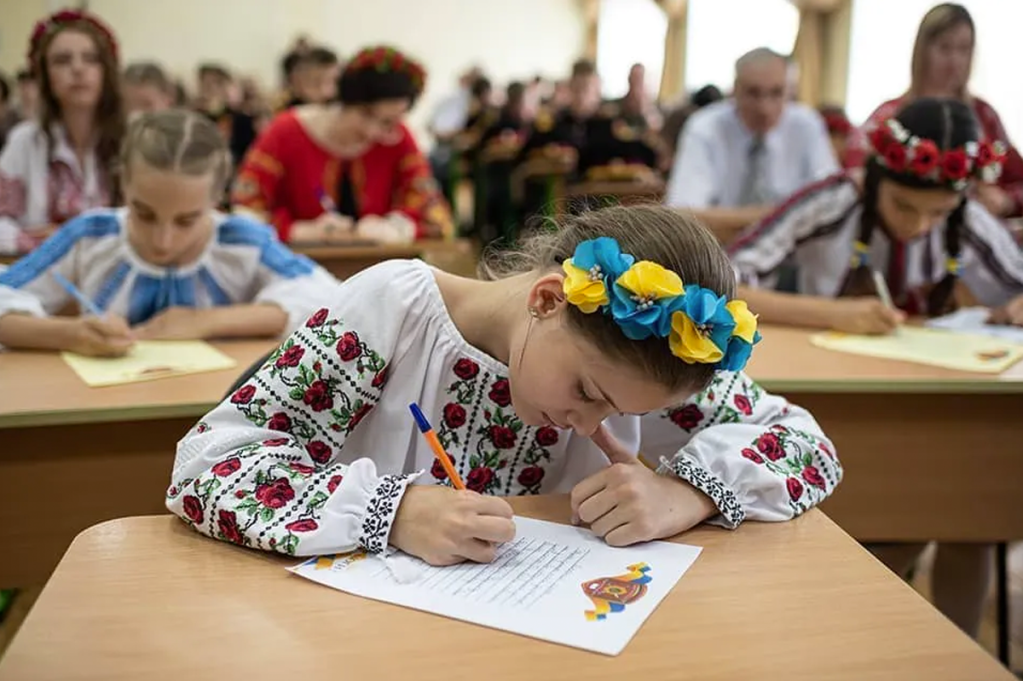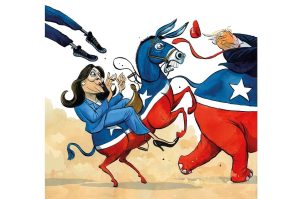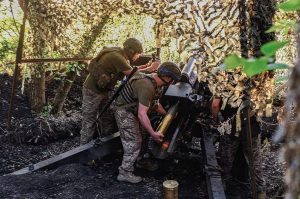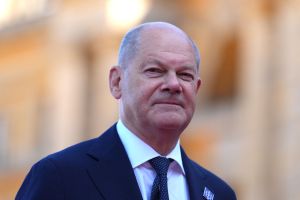For the first time since Russia’s invasion, schools in Ukraine are starting to reopen. For many parents, including my own, this presents a dilemma. Is it safe for pupils to return? My brother is seven and has spent the past year doing “remote learning,” which is hard enough in countries at peace, let alone those fighting an invasion. A return to school would be good for his education, but then again, might there be the danger of Russian air strikes? Parents at my brother’s school have been asked to vote on whether they would prefer pupils to continue with online learning, or return, with all the risks involved.
It’s estimated that at least 3,000 of Ukraine’s 12,800 schools will reopen their doors. Many do not have proper bomb shelters, which are a necessity for a country digging in for a long war. Given that air warnings sometimes last for hours, pupils need desks and toilets underground if they are to carry on studying. Most schools have had to fit bomb shelters at their own expense and in some cases parents have been asked to chip in with the funding.
The curriculum has also been overhauled. Ukraine believes it is fighting for its soul as well as its borders, and the education of children is seen as a major line of defense. As a result, children are to be given military and medical training during their new “Defense of the Fatherland” classes. Pupils will learn about repression and resistance, as well as the “handling of explosive and unfamiliar objects.”
All history, geography and literature lessons have been updated. The history curriculum now includes “new historiographic developments” with a special module on the history of the invasion. Geography will focus on the countries involved in the war: those who helped Ukraine, but also those who supported Vladimir Putin. Ukrainian pupils will be told who their friends are — and aren’t. Russian and Belarusian writers have been removed from the core curriculum and replaced with western writers, including Joseph Roth and Robert Burns.
A pantheon of new Ukrainian heroes who have emerged since the February invasion will also appear. Legal studies will include more terms from international humanitarian law: relevant for a country that sees war-crime prosecution as a line of defense. One module will focus on the concept of “Russkiy Mir” — Putin’s idea of the Russian world, in which he believes Ukraine belongs — which lay behind the invasion. “Rusizm” (Russian Nazism) and “Russification” (attempts to replace Ukrainian culture with Russian) will feature, too.
Both sides see education as a battlefield. Sergey Kravtsov, Russia’s education minister, has announced that in the occupied regions of Ukraine, classes will be decided “according to Russian standards.” This is best for Ukrainians, he says, because Russian school education is “one of the best in the world.” The lessons in these regions would be as they were under the Soviet Union: using the Russian language and Moscow’s curriculum. In many ways, the Kremlin is reverting to old methods. In Melitopol, an occupied city in the Zaporizhzhia region, Ukrainian parents have even been told that their children could be taken away from them if they do not go to school. But Ivan Fedorov, the city’s exiled mayor, has said he has “absolutely no idea” how Russians would make good on such a threat.
And with so many teachers having fled these regions, it remains to be seen who will take these classes. Ukrainian teachers living under occupation have been threatened with long prison sentences if they do not show up to teach. But working for the Russians is seen as high treason by the Ukrainian government and there are no exemptions for teachers as yet. So if teachers do show up to schools in occupied territories, they can technically be jailed for collaboration.
To reinforce its own position, Russia has sent in more than 200 teachers to these regions. They are paid a daily fee of 7,000 roubles, which is roughly seven times what they’d earn at home in Russia. Some will be Russian nationalists seeking to do “patriotic work” in Ukraine. As one history teacher from the remote Siberian town of Omsk put it: “There can be no division into Russians and Ukrainians, because we are one Russian people… and there is no Ukrainian and Belarusian languages — there are two dialects of the Russian language.”
Russian teachers are also being lured to Ukraine with the promise of free property. “In the Zaporizhzhia region, my wife and I may receive a plot of land,” said Yuriy Baranov, another history teacher who was quoted in the Russian press. “My wife wants her own garden at our new home.” Daria Ganieva, an English teacher who moved to Crimea from Russia, is quoted as saying that she too is hoping to receive a property. “Even if Ukraine regains control,” she assures readers, “people will not be left abandoned. In extreme cases, we will be evacuated or somehow supported.” It is highly likely that if they are given houses, these will have once belonged to Ukrainians who have been killed or are exiled.
Against this backdrop, Ukrainian pupils are trying to continue their education. My brother was born in 2014 and has only ever known a Ukraine at war in one way or another. He has not spent much time in school, thanks to Covid and Putin. But packed classrooms would be an obvious target for the Kremlin. Parents like mine must ask themselves a difficult question: whether a regime that has already attacked Ukrainian hospitals and kindergartens would stop at schools.
This article was originally published in The Spectator’s UK magazine. Subscribe to the World edition here.





















